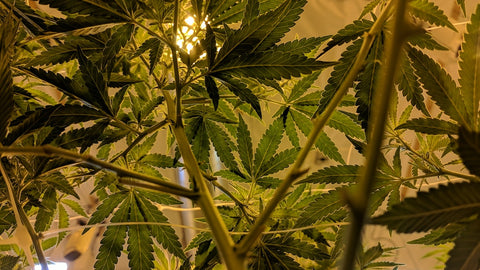Picture this: you're sitting cross-legged on a comfy cushion, eyes closed, and a sense of tranquility washes over you. Your mind begins to quiet down, and you find yourself entering a state of deep relaxation. Now imagine adding a little something extra to enhance this experience - cannabis.
Yes, you read that right. Cannabis and meditation can go hand in hand, creating a unique and profound practice that allows you to explore new depths of consciousness. In this article, we'll dive into the fascinating world of combining marijuana with meditation, exploring its benefits, considerations, and tips for incorporating it into your practice.
The Art of Mindful Intoxication
Before we dive in, it's important to note that the combination of cannabis and meditation is a personal choice, and it may not be suitable for everyone. Just like any other substance, cannabis affects individuals differently, and it's crucial to approach it with mindfulness and moderation.
When used intentionally and mindfully, cannabis can help heighten awareness, deepen relaxation, and open doorways to new insights during meditation. It can enhance the mind-body connection and serve as a tool for self-exploration and self-discovery.
Benefits of Cannabis-Infused Meditation
So, what exactly are the benefits of incorporating cannabis into your meditation practice? Let's take a closer look:
1. Deepened Relaxation:
Cannabis has a well-known reputation for its relaxing properties. When used before meditation, it can help release tension in the body and ease the mind into a state of deep relaxation. This allows you to more easily let go of distractions and sink into a meditative state.
2. Heightened Awareness:
By activating certain receptors in the brain, cannabis can enhance sensory perception and increase awareness of the present moment. This can deepen your meditation practice by allowing you to fully immerse yourself in the sights, sounds, and sensations around you.
3. Expanded Creativity:
Many artists and creatives have long used cannabis to tap into their creative flow. If you're looking to explore your creativity through meditation, cannabis can help unlock new ideas and perspectives, enabling you to approach your practice with fresh insights.
4. Enhanced Spiritual Connection:
Cannabis has been used for centuries as a sacrament in spiritual rituals. When used in a sacred and intentional manner, it can enhance your spiritual connection and facilitate a deeper exploration of your inner self. It can help dissolve barriers and allow for a more profound spiritual experience during meditation.
Considerations for Cannabis-Infused Meditation
While cannabis can enhance your meditation practice, it's essential to approach it with thoughtfulness and awareness. Here are a few considerations to keep in mind:
1. Finding the Right Strain:
Not all cannabis strains are created equal when it comes to meditation. Sativa strains, known for their energizing effects, may be better suited for a more active meditation practice. On the other hand, indica strains, with their calming properties, may be ideal for a more relaxed and introspective meditation session. Experiment and find the strain that aligns with your intention.
2. Mindful Dosage:
Start low and go slow. It's crucial to find the right dosage that allows you to experience the desired effects without overwhelming your meditation practice. Cannabis affects everyone differently, so take the time to understand how it affects you personally and adjust your dosage accordingly.
3. Set Intentions:
Before incorporating cannabis into your meditation, set clear intentions for your practice. What do you hope to achieve or explore? By setting intentions, you create a framework that guides your experience and helps you stay focused during your meditation session.
4. Create a Sacred Space:
Designate a specific area for your cannabis-infused meditation practice. Clear the space of distractions, create a comfortable and inviting atmosphere, and incorporate elements that promote relaxation and introspection. This will help you cultivate a sense of sacredness and set the stage for a transformative experience.
Tips for Incorporating Cannabis into Your Meditation Practice
Ready to embark on your cannabis-infused meditation journey? Here are a few tips to help you get started:
1. Start with a Simple Breathing Exercise:
Begin your session with a simple breathing exercise to center yourself. Focus on your breath, inhaling deeply through your nose and exhaling through your mouth. This will help calm your mind and prepare you for the deeper states of meditation.
2. Use Cannabis as a Catalyst:
Think of cannabis as a catalyst that assists your meditation practice. It's not the main focus but rather a tool that helps you access deeper states of relaxation and awareness. Use it to amplify your experience, not as a crutch.
3. Explore Different Meditation Techniques:
Experiment with different meditation techniques to find what resonates with you. Whether it's mindfulness meditation, loving-kindness meditation, or transcendental meditation, each technique can be enhanced by the mindful use of cannabis.
4. Reflect and Integrate:
After your cannabis-infused meditation session, take a few moments to reflect on your experience. Journaling can be a helpful tool to capture any insights or revelations that arise during your practice. Use these reflections to integrate what you've learned into your daily life.
Unlocking New Heights of Consciousness
Combining cannabis with meditation can open new doors of perception and elevate your practice to new heights. However, it's essential to approach this combination with intention, mindfulness, and respect for the plant and its effects.
Remember, cannabis is a tool that can enhance your meditation practice, but it's ultimately your own presence and intention that will guide you on your journey of self-discovery. So, if you're curious about exploring the profound connection between cannabis and meditation, why not give it a try? Embrace the possibilities, expand your consciousness, and unlock new realms of inner peace and self-awareness.



